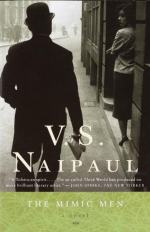|
This section contains 807 words (approx. 3 pages at 400 words per page) |

|
The Mimic Men: A Novel Summary & Study Guide Description
The Mimic Men: A Novel Summary & Study Guide includes comprehensive information and analysis to help you understand the book. This study guide contains the following sections:
This detailed literature summary also contains Quotes and a Free Quiz on The Mimic Men: A Novel by V.S. Naipaul.
The following version of this book was used to create this study guide: Naipaul, V.S. The Mimic Men. Vintage, 2001.
The Mimic Men follows Ranjit Kripal Singh, a man of Indian heritage who was born on the Caribbean island of Isabella in the 1920s. Isabella is a fictional island based on the author’s own birthplace of Trinidad. Because Isabella is a colony of the British Empire, Singh is a British citizen The novel is structured as Singh’s memoir, which he writes at the age of 40 from a hotel in the suburbs of London after being ousted from the government of Isabella and from the island itself. Singh’s memoir begins in the period when he was a student at an unnamed London university. He lived in a London boarding house and befriended a young Maltese woman named Lieni. Through Lieni, Singh was introduced to many other people in London who, like Lieni and Singh, were originally from countries that had been colonized by Britain.
At the university, Singh met a young woman from North London named Sandra, who was also a student there. Singh and Sandra soon became romantically attached. Sandra was younger than Singh, and after Singh had graduated from the university, Sandra failed an important exam and was not allowed to graduate. Because Sandra had no substantial prospects, Singh agreed to marry her, and together they moved to Singh’s birthplace, the island of Isabella. A few years prior to their return, Singh’s maternal grandmother had died. Singh’s paternal grandparents owned the bottling factory on the island and thus were quite wealthy. In her will, Singh’s grandmother bequeathed Singh some money and a large tract of land. Singh divided this land into lots and rented them out for development. The development was a success, and Singh became quite wealthy. However, his gains eventually felt hollow and unsatisfying, and his marriage to Sandra began to feel joyless.
Singh then transitions to his childhood, which he spent on Isabella. His father was a schoolteacher, and his mother was the daughter of the owners of the island’s bottling factory. Singh had an uncle, Cecil, who was only a few years older than Singh. There was much friction between Singh’s father and Cecil, as Cecil had little respect for his elders, and he constantly bragged about the fortune his parents had made as owners of the bottling factory. As a boy, Singh attended Isabella Imperial, which was run by the British government. Singh describes his friends at school and his relationship with his father. He recalls a specific episode in which he and his family went for a drive around the island, and Singh observed the impoverished neighborhoods, which were predominantly comprised of black residents. Singh recalls despising these people due to their poverty. However, Singh’s friend Browne gradually developed a heavy conscience on behalf of these economically downtrodden people, and in light of these differing views, their friendship eventually ended.
Singh recalls that one day, his father quit his teaching job and went to live in the forest with groups of poor people on the island. Singh’s father became a spiritual leader and social activist, and the government sent police officers to suppress this activity. However, the movement eventually died out on its own. Singh’s father was placed in an internment camp during World War 2, and he was released after six years. Meanwhile, Cecil inherited the bottling factory after his parents’ deaths, but he ran it into the ground, lived wantonly, and behaved erratically. After Singh’s father was released, Singh went to visit him and to say goodbye before leaving to go study at a university in London. While in London, Singh eventually received a letter from Isabella that said his father had been shot and killed by Cecil.
The memoir then transitions back to Singh’s adult life on Isabella. He was approached by Browne, who had founded a socialist newspaper and wished to have Singh as a collaborator. Singh agreed, and a strong political following coalesced around the newspaper. Singh and Cecil used this support to successfully run for offices in Isabella government, and Cecil was elected as Chief Minister. Unfortunately, politics revealed themselves to Singh as being quite messy. Singh traveled to London to acquire independent nationhood for Isabella, as well as several important economic contracts, but he failed. After he came back to Isabella, his marriage ended and he was ousted from both Isabella government and from the island itself. He moved to London at the age of 40, where he took up residence in a hotel in a suburb of London. There, he wrote his memoir and was able to use the writing process as a way of processing and coming to terms with the events of his life.
Read more from the Study Guide
|
This section contains 807 words (approx. 3 pages at 400 words per page) |

|



